EcoBirdy's sweet Rhino lamp borrows both its name and its appearance from the rhinoceros. The cheerful lamp is designed to raise awareness not only of the endangered species but also of the need for sustainability: the rechargeable lamp is made entirely from recycled plastic toys and games – so the colourful little dots decorating the luminaire have actually been children's toys in their previous life. The playful Rhino is the perfect night light to guard your child's sleep, and can also be used in the nursery to watch over the day’s plays. And why not in the parents’ bedroom or in the living room as a witty decorative element, too!
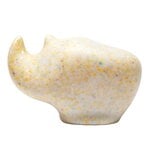
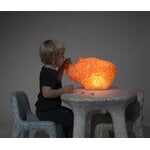
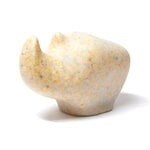
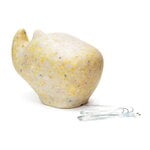
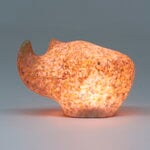
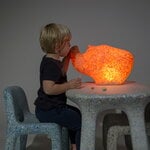
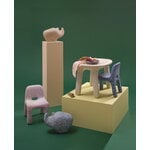
Rhino lamp, vanilla
ecoBirdy
Description
EcoBirdy's sweet Rhino lamp borrows both its name and its appearance from the rhinoceros. The cheerful lamp is designed to raise awareness not only of the endangered species but also of the need for sustainability: the rechargeable lamp is made entirely from recycled plastic toys and games – so the colourful little dots decorating the luminaire have actually been children's toys in their previous life. The playful Rhino is the perfect night light to guard your child's sleep, and can also be used in the nursery to watch over the day’s plays. And why not in the parents’ bedroom or in the living room as a witty decorative element, too!
Product details (21)
- Material
- Ecothylene® (100 % recycled plastic)
- Colour
- Multicolor light yellow
- Length
- 42 cm
- Width
- 23 cm
- Height
- 27 cm
- Bulb base
- E27
- Light source
- 5W LED (included)
- Colour temperature
- 3,000 K
- Luminous flux
- 470 lm
- Lifetime
- 25,000 h
- IP rating
- 20
- Protection class
- II
- Voltage
- 220–240 V
- Nominal frequency
- 50 Hz
- Certifications and labels
- CE marked: tested and approved according to European standards
- Plug
- EU plug
- Cable length
- 130 cm
- Cable colour
- Transparent
- Cable material
- Coated metal
- Weight
- 1.4 kg
- Dimmable
- No
- Product ID
Reviews (0)
Sustainability
The Product Sustainability Framework, our criteria of sustainable design, helps you find the most sustainable products in our selection. Read below which sustainability criteria this product has met.
Working conditions & labour 8/9
-
Equal opportunities for all employees
-
Commitment to UN Global Compact, fair compensation for all employees
-
Corporate responsibility requirements defined and communicated for suppliers
-
Systematic work for improved inclusion and well-being in the workplace
-
Transparent supply chain
-
Suppliers' compliance to a code of conduct ensured
-
Compliance to the UN Guiding Principles on Business and Human Rights ensured in the supply chain
-
Support for community involvement in the supply chain
Eco-friendly production 9/9
-
Fair and resource-wise water-use in production
-
No incineration or landfilling of returned items
-
No use of endangered species as materials
-
No direct environmental emissions or waste (excl. GHGs) from production
-
The sustainability of direct suppliers' production is addressed and monitored
-
Production and material sourcing that respect biodiversity, animal rights, and natural ecosystems
-
Material-efficient and ecological packaging
-
Positive impact on nature’s well-being through operations that regenerate natural ecosystems
-
No potentially harmful chemicals used in own production
Climate impact 6/8
-
Company's direct greenhouse gas emissions identified and commitment to reduction
-
Product's carbon impact identified and commitment to reduction
-
Guidance on energy- and eco-efficient use of the product
-
Contribution to climate initiatives beyond the brand’s direct operations
-
100 % renewable energy in own production and operations
-
Carbon neutral or carbon negative product
Sustainable materials 6/6
-
Sustainable and long-lasting material choices
-
No harmful or hazardous substances
-
Responsible raw material sourcing and production
-
Materials suited for circularity: monomaterials, recyclable finishings, renewable or recycled contents etc.
-
Ecological materials: natural, biodegradable, recyclable or recycled contents
-
Outstanding materials in terms of innovativeness, responsibility, sustainability and circularity: local production or sourcing, 100 % recycled content, C2C-certification etc.
Circular design 5/5
-
High aesthetic quality promoting long-term use of the product
-
Technically durable product design and material choices
-
Design for enduring life-long quality
-
Design and support for product maintenance, repair and upgradability
-
Innovative circular design solutions: circular service system, resale platform, remanufacturing, collection of used products, etc.










